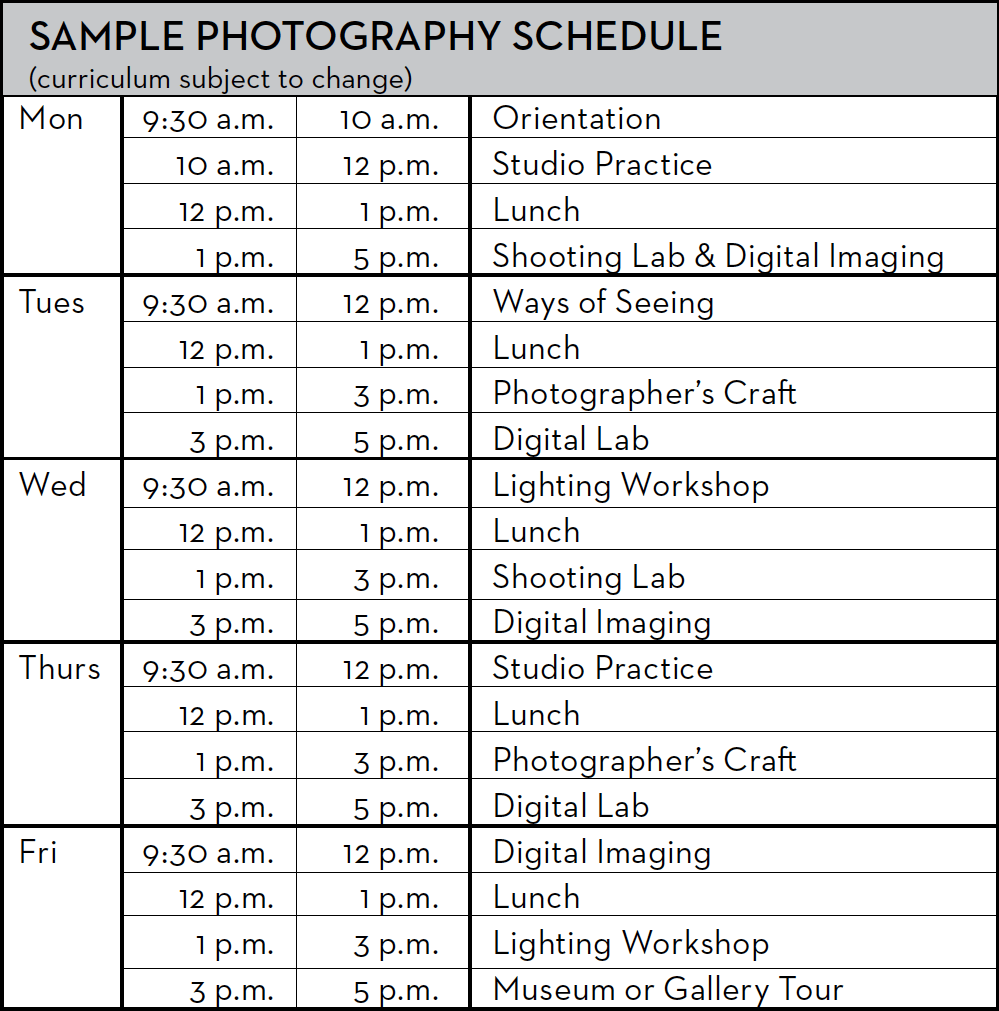Welcome!
Welcome to the New York Film Academy’s teen summer camps in New York City! Now in its 24th year at our New York location, the camp offers intensive, conservatory-style workshops in filmmaking, acting for film, screenwriting, musical theatre, photography, documentary filmmaking and broadcast journalism. Whatever program you’re in, be ready to commit yourselves to an intensive, exhausting, exhilarating and creative process!
We ask that both parents and students read through this packet, which provides information that will prove invaluable in orienting yourselves to our program.
We look forward to seeing you this summer!
NYFA at a Glance
MISSION STATEMENT
 Through its educational programs, the New York Film Academy (“NYFA”) propagates visual literacy and visual storytelling through hands-on intensive learning. It seeks to make visual storytelling education accessible to the most diverse, international, and broadest possible spectrum of campers, and to hone the skills of future professionals so that they may one day serve the visual storytelling arts as industry leaders.
Through its educational programs, the New York Film Academy (“NYFA”) propagates visual literacy and visual storytelling through hands-on intensive learning. It seeks to make visual storytelling education accessible to the most diverse, international, and broadest possible spectrum of campers, and to hone the skills of future professionals so that they may one day serve the visual storytelling arts as industry leaders.
EDUCATIONAL PHILOSOPHY
NYFA Teen Programs are based on the philosophy of “learn by doing.” Every curriculum stems from that belief. NYFA believes that the most effective way for our campers to master their chosen craft is to immediately start creating their own work in a hands-on intensive working environment.
NYFA VALUES
Leadership – To be a successful artist in these collaborative fields, leadership qualities are important. Through the work and development of the projects that campers make or perform in, they can enhance their ability to engage others to work together and create impactful art.
Creativity – We encourage campers to think outside the box. The challenges inherent in these crafts force campers to develop creative solutions to achieve desired results.
Collaboration – Quality leadership and collaboration go hand in hand. To achieve educational and creative goals, campers must work together and often depend on their classmates’ assistance to execute their projects. Collaboration fosters the ability to conduct oneself with professionalism and respect to others and their creativity.
Discipline – The discipline required to create quality work is extraordinary. A camper will need to practice the art of discipline, and try their hand at a craft that requires full dedication to succeed.
Expression and Individuality – Through visual and performing arts, our campers have an extraordinary opportunity to express their point of view and discuss their thoughts, ideas and concerns. We encourage campers to use their own experiences to inform their work, which often results in truthful and moving storytelling.
OUR INSTRUCTORS
NYFA’s faculty members are active performing and visual arts professionals. They all have a passion for the arts including storytelling and teaching and are consistently given the highest praise from our campers.
STAFFING
The Director of Teen Programs supervises all Teen Program staff, which includes counselors, instructors and technical assistants. Questions regarding Camper Services should be directed to the Director of Teen Programs.
Registration
All NYFA camps have open enrollment, though NYFA prerequisites may apply. No previous experience is required. The application for the camps may be filled out online. A deposit ($500) is required to secure the camper’s spot in the program of their choice. Once the application and the deposit have been made, the camper will receive an online packet containing forms that must be filled out by the camper and their parents/guardians. Such forms include COVID-19 vaccination if any and Acknowledgment Form, housing request, airport pick up and drop off, medical conditions or allergies, etc.
COVID-19 Safety Protocols
New York Film Academy is excited to return to campus this summer for our Teen Summer Camps. At this time, however, COVID-19 is still a risk, and special precautions are necessary to keep our campers, faculty and staff safe. Should circumstances concerning the spread of COVID-19 change, NYFA may update or change its safety protocols, and any such changes will be communicated to campers and their guardians. All campers will be required to adhere to all safety protocols implemented by NYFA. Currently, all NYFA attendees are strongly encouraged to be fully vaccinated and boosted, when eligible. Wearing N95 face masks or face masks of comparable quality on campus, in the dormitories, or when present in group settings, “on and off campus,” is also encouraged, but not required.
It also must be understood, regardless of the safety precautions that NYFA takes to protect our community, NYFA cannot guarantee the elimination of all risk or the spread of infection. Additionally, as per NYFA’s published Covid Safety Plan, should a significant spread of infection be detected, as determined by our Covid Team administrators according to predetermined metrics, NYFA may close its facilities and take all programs online.
Summer Camp Forms In Applicant Portal
Parents and students will need to sign all required Summer Forms in the Application Portal.
In addition to signing all required forms, you will need to submit Health Examination Form, front and back copy of medical insurance card detailing health information (for student), and a CURRENT photo (of student) in the Applicant Portal.
If you have any questions, contact us at 212-674-4300 or email [email protected]
Arrival
Commuting students do not have scheduled activities or classes on the Sunday start date of the program. Please see the Registration/ Orientation section for instructions on arrival.
Students electing to stay in New York Film Academy housing may also utilize our airport transportation from all three major NYC area airports to the residence. These airports include LaGuardia (LGA), Kennedy Airport (JFK), and Newark (EWR). Please submit the Arrival & Departure form online as soon as possible with the indicated travel information if you would like to take advantage of this service.
Please book a flight to ARRIVE BETWEEN 10 a.m. and 3 p.m. on your arrival date! If you submit the Arrival & Departure form with flight information, a New York Film Academy counselor will greet you at baggage claim. Counselors will be wearing
New York Film Academy t-shirts.
It is very important that you arrive and depart on the listed start date and end date for your camp. We are unable to accommodate transportation or housing on alternate dates.
6-WEEK PROGRAMS:Sunday, June 30 |
3-WEEK PROGRAMS:Sunday, June 30 |
1-WEEK PROGRAMS:Sunday, July 7 |
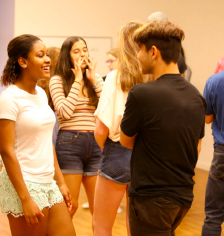 If you choose to make your own travel arrangements from any airport, train station, bus terminal to the dorm, or if you are arriving by car, please see the travel directions listed below.
If you choose to make your own travel arrangements from any airport, train station, bus terminal to the dorm, or if you are arriving by car, please see the travel directions listed below.
Address for residential registration: 33 Beekman St., New York, NY 10038
FROM JFK AIRPORT
Taxi stands are located at most terminals (flat fee of $70 plus additional tolls and tip). Other car services like Uber, Lyft, Juno, and Via are available at JFK. For the more economically-minded, you can follow the signs for the Air Train.
Air Train: Take the Air Train to the Howard Beach/JFK station of the A line. Take the A train to Manhattan.
FROM LAGUARDIA AIRPORT
Taxi metered cost ranges from $30 – 38, plus tolls and tip. Alternatively, private companies run shuttle buses every 20 30 minutes from 6:45 a.m. until 12 midnight, at rates ranging from $10-$15. Car services like Uber, Lyft, Juno, and Via are available at LGA.
FROM NEWARK AIRPORT
Taxis from Newark are often more than $75 once tolls and fees are added to the base price. Car services like Uber, Lyft, Juno, and Via are also available at Newark.
FROM PENN STATION (INCLUDES AMTRAK)
A taxi will cost approximately $20 with tip. Subway lines also run conveniently to our location. ($2.90 per subway ride).
FROM PORT AUTHORITY BUS TERMINAL
A taxi from Port Authority will cost around $20 with tip. Subway lines also run conveniently to our location. ($2.90 per subway ride)
BY CAR
As there are many points of entry into Manhattan, it is advised that you use an online service to map your route. You may load/unload directly in front of the residence (however, it is illegal to park there). There are multiple parking garages in the neighborhood.
Registration & Orientation
All Students will be registered, on-line, during the week leading up to the program start date, if all information, documents, and payments have been received. Once registered, students will receive information about their NYFA student email account, NYFA Symptom Tracker, and a Welcome Letter from the Teen Camp Director.
There will be a brief student orientation worked into the schedule on the first day of classes. Orientation, for students only, will cover student supervision, rules and regulations, and COVID-19 Safety protocol. Students will receive their schedule and NYFA Student ID upon arrival on the first day of classes.
It is recommended that commuter students plan to arrive around 9:00 a.m. on the first day of classes. Students who reside at the residence will walk to the classroom facility together and join the commuting students for orientation. Please see the Housing Move-in and Orientation section for instructions on arrival to the dorms.
Location: 26 Broadway, 12th floor, New York, 10004
6-WEEK PROGRAMS:
First day of classes: July 1st
3-WEEK PROGRAMS:
First day of classes: July 01 & July 22 2024
1-WEEK PROGRAMS:
First day of classes: July 08, July 15, July 29, & August 5
Housing Move-In & Orientation
Students who have been confirmed for housing will check-in and move into the residences at 33 Beekman St New York, NY 10038 on the Sunday before classes during the specified times below:
6-WEEK PROGRAMS:
Residential Registration: June 30, 12 – 4 p.m.
3-WEEK PROGRAMS:
Residential Registration: June 30 and July 21, 1 – 5 p.m.
1-WEEK PROGRAMS:
Residential Registration: July 7, July 14, July 28, August 4, 3 – 5 p.m.
Students who are living in the dorms will receive keys and room assignments during check-in. A special orientation social for students only will be held at the residence and will take place the evening after move-in around 6 p.m.
All students staying at the residence will join commuting students at the school for the main orientation on the first day of classes.
Housing
You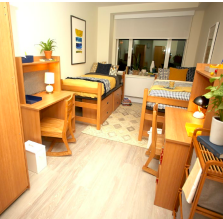 will have an opportunity to indicate whether or not you will need housing for the duration of your program in the Summer Forms within the Applicant Portal.
will have an opportunity to indicate whether or not you will need housing for the duration of your program in the Summer Forms within the Applicant Portal.
You will also have the opportunity to make a specific roommate request in the forms. Room assignments may not be changed. Payment for the dorm rooms should be made directly to the New York Film Academy. Housing is not guaranteed until the New York Film Academy confirms availability and the receipt of the housing payment.
The residence is a dormitory with shared rooms. Each room will include furnishings, a small refrigerator, wifi, and a bathroom. Studentsmust provide their own linens, pillows, and towels.
We will take students on a shopping trip on their arrival day to purchase any supplies or snacks they wish to keep in their room and we will stock their rooms with grab-and-go style snacks, but meals are not included.
2024 PRICES
1-week shared room $1,250*
3-week shared room $3,600*
6-week shared room $7,500*
*A meal plan is not available for this location; Students may spend up to $250 per week on food depending on eating habits.
(Transportation to and from dorm/school is included for dorm students. Rates do not include lunch, dinner, or snacks.)
PLEASE NOTE: In addition to the housing fee, a $250 room and key deposit is required.
YOUR CREDIT CARD WILL BE CHARGED FOR THE DEPOSIT. THE DEPOSIT IS REFUNDED IF THERE IS NO DAMAGE DONE TO THE ROOM AND ALL KEYS AND ACCESS CARDS ARE RETURNED.
All deposit refunds will be processed at the end of the summer and will be returned shortly thereafter.
SUPERVISION
There will be a staff of residential advisors living in the dorms and providing adult supervision. They also lead activities in the evenings for all programs and on weekends for programs longer than one week. There is always a residential advisor on duty. An RA hotline number will be given to you at registration and orientation.
No student is allowed to leave the buildings alone. “Buddies” (two or more students) sign out together and sign back in as a group. Students with cell phones are asked to have their phones charged and on at all times.
If there are any questions regarding supervision, please feel free to contact us.
ACTIVITIES
On weeknights, residential students may participate in supervised activities such as sightseeing, game nights, seeing classic and new films at the theatre, or neighborhood tours (Times Square, SoHo, etc). On weekends, our residential staff will lead the six, four, and three-week students on excursions. These activities may include a day at Coney Island with tickets for rides, a scavenger hunt in Central Park, or other all day excursions. Sundays are generally optional outings to the incredible museums New York City has to offer. All activities are included in housing prices.
FACILITY
The residence includes high-speed internet access, air-conditioning, and supervision by our residential staff. Pillows and linens are not included.
Dormitories are designed and maintained for the accommodation of students. As should be expected with dormitories, the accommodations are utilitarian. It is suggested that participants bring an alarm clock and cell phone.
Electrical appliances such as toaster ovens and hot plates are fire hazards and will be confiscated. Additionally, incense, candles, and halogen lamps are strictly prohibited. Pets of any kind are not permitted on the premises at any time.
The dormitory is a short walk from our classroom facilities. Be sure to bring an umbrella in case of inclement weather. Transportation to and from any evening/ weekend group activities will be provided.
LINENS & LAUNDRY
Students will need to bring their own linens, pillows, and towels. Sheet sets should fit a twin XL bed. It is the responsibility of the student to wash his/ her own laundry, as needed. NYFA Staff will help facilitate a laundry service to wash and fold student’s laundry for a weight-based fee.
DORM MEALS
Students who reside in the dormitory will be provided with grab and go style snacks. For lunch and dinner, students will have the opportunity to take advantage of all of the amazing cuisines of NYC. Students will have many lunch choices around the classrooms and dinner choices either around the dorm or out on an activity. During this time we utilize a buddy system and a strict check out and check in process with our staff. Students are never allowed to take any transportation without NYFA staff.
Dormitory residents can expect to spend approximately $200-$250 per week on food (depending, of course, on restaurant preferences).
MAIL, PHONE, & INTERNET
If available, it is beneficial for students to bring cell phones. There are stores in the area to purchase SIM cards for international phones.
High-speed wifi is available throughout the residence as well as in the classrooms.
Students may receive mail during their stay at the New York Film Academy. All packages and letters must include “New York Film Academy Camp.” Packages will be held by NYFA counselors and delivered to students during their nightly room check.
Mailing Address for Beekman Residents:
Beekman Residence Hall
New York Film Academy Camp
[Student’s Name]
One Pace Plaza
New York, NY 10038
GETTING MONEY
We recommend that students set up an account with an ATM card instead of bringing large sums of cash or traveler’s checks. This has proven to be the safest, easiest way to transfer money, as well as to monitor spending. There are many ATMs located near the school and dorms.
Out of pocket expenses that arise (not including lunch, dinner and snacks) are souvenirs and laundry. Typically, $50/week is sufficient spending money in addition to the student’s food budget.
CLOTHING
The weather in New York City in the summer is usually warm and humid and the style of the summer camps is definitely casual.
Shorts, casual pants, and t-shirts are acceptable. Light sweaters or jackets are suggested for highly air-conditioned classrooms and some cooler evenings. Students, however, may wish to bring something a little nicer to wear for their final graduation events.
Students should bring running shoes, rain gear, sunglasses, sunscreen, etc.
TRAVEL
While we respect the maturity and intelligence of our students, they are still legally minors, and travel rules exist for their own protection.
Throughout the summer, we will be organizing evening and weekend activities for the overnight students. Students will periodically be taken as a group to stores (pharmacies, the grocery) to provide for their basic needs.
Teens in the New York City program are not allowed to travel around the city without an escort (with the exception of lunch and dinner). Students who violate this rule risk expulsion without a refund.
CURFEW
Throughout the program there will be a building curfew at which time all students are required to be in the building. There will also be a room curfew at which time all students are required to be in their rooms.
ROOM & KEYS
No visitors are allowed into student dorm rooms, with the exception of family members during move in and move out days (with approval from the residential advisor on duty), other NYFA dorm students, and NYFA staff.
* Commuting students are not allowed in the dorm rooms!
Keys: If you lose your key, there is a $20 charge for a replacement. Dorms will be checked by NYFA staff at check-out, at which time the key must be returned. Any damage will be documented and charged accordingly.
LEAVING THE RESIDENCE
Students who reside at the residence will walk 10-15 minutes to the classroom facility. Transportation will also be provided to and from any evening and weekend activities when necessary.
Students staying at the residence who wish to leave to spend time with family must have a parent notify the residence director, whose contact information will be provided at registration and/or orientation. Notification can take the form of either a signed permission letter or an e-mail from a parent’s e-mail address that must be in our files.
Meals (Commuting Students)
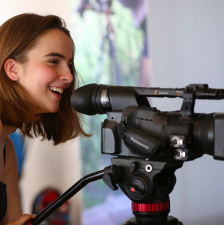
Lunch and snacks are not included in the tuition cost. During lunch period, students can explore the cafés and restaurants in lower Manhattan. Within a five-minute walk, students can access everything from tacos to falafel, salads to sushi.
For snacks and beverages during school breaks, eateries are located near our buildings.
Since NYFA New York City teen camps’ inception, we have allowed students to patronize local eateries. Our staff is well-versed in the supervision of teen students during meals. Students are required to sign out with our residential advisors, and must utilize the “buddy” system and be accompanied by at least one other student while out.
Getting There
Students who reside at the residence will walk to the classroom facility together. Transportation is provided to & from dorm evening weekend activities.
For commuting students, please make all transportation arrangements before the program begins. It is important that all students arrive on time every day (by 9 or 9:30 a.m. as set by the program schedule) and have transportation available to return home at the end of the day. Classes will generally end at 5 p.m.
Classes will take place at our main building:
26 Broadway, 12th floor,
New York, NY 10004
Commuting by Subway:
NYFA is easily accessible by many subway lines. The facilities are situated a short walk away from numerous subway lines in lower Manhattan. If you’d like exact instructions door-to-door via subway or bus, an excellent resource is google maps or citymapper.com/nyc
Medical Care
If students find themselves in need of medical attention, they must immediately advise office staff or a residential advisor. Arrangements will be made to escort the student to the nearest medical facility.
Remember to fill out the medical information form in the Applicant Portal and upload the front and back of your insurance card.
Please bring a supply of any prescription medicine you will need. Students are required to self-medicate.
Please inform us of any allergies you may have on the Medical Release Form(to be completed online).
We suggest you contact your insurance provider if you are unsure whether your policy covers you in New York, NY.
Rules & Regulations
For a detailed list of rules, please see the Camper/Parent Handbook in the Applicant Portal. Remember, the form must be (digitally) agreed to by both parents and students!
By signing, you acknowledge that you have read and agree to the rules set forth here. NYFA reserves the right to present additional rules/regulations at registration. These will be reviewed at orientation on the first day of the program.
Please keep in mind that the rules exist to make sure that everyone is safe and that the programs run smoothly. Our rules have never prevented any student from having an incredible experience!
All film shoots are supervised by an adult teaching assistant. Excluding lunch and breaks, at no time are students allowed outside of the school grounds without special consent from a parent or guardian.
During camp hours, students are not allowed to leave the buildings alone. “Buddies” (two or more students) sign out together and sign back in as a group. During lunch, students will be required to check out with at least one other student and return to campus with that student at the end of lunch break. Students with cell phones are asked to have their phones charged and on at all times.
The visual and preforming arts are a collaborative field. Students are required to treat their fellow classmates, their teaching assistants and their instructors with the level of respect they expect to receive, themselves.
Students who are consistently tardy, irresponsible, or disruptive run the risk of being removed from the program. Likewise, intolerance shown in regards to race, ethnicity, religion, gender or sexual orientation may result in expulsion.
DRUGS & ALCOHOL-ZERO TOLERANCE POLICY
Drugs and alcohol are strictly prohibited. Students found with drugs or alcohol in their possession will be immediately expelled from the program at their and/or their parents’ expense.
This includes procuring drugs or alcohol for someone else, even if you personally did not partake in their consumption.
There will be no exceptions.
Expelled students will not receive a refund of any kind.
Departure
Commuting students finish the program on the last day of class (Friday). Residential students’ departure date is the last day of the program dates (Saturday). We cannot accommodate departures after your programs’s end date. Residential students must check out of their room by 11 a.m. on their program’s end date.
Parents transporting students by car or traveling together by bus or plane should pick up their teen by noon on Saturday. Students flying alone will have the opportunity to utilize our airport transportation for their departure. Please be sure the departure flight information is provided to us in the Applicant Portal within the Arrival & Departure section. Please book a flight to depart no later than 3 p.m. on your departure date. All airport shuttles will depart no later than noon.
International Students & Travel/Visas
Campers should travel on a tourist visa or visa waiver* to attend the summer teen programs. When you enter the U.S., you should state that you are attending “SUMMER CAMP.” The camps are classified as recreational in nature and not academic, so student visas are NOT needed! You should not say you are coming to the U.S. for school! You are coming to CAMP!
Please make sure the camper’s passport is valid for at least six months past the intended departure date. Please note, if you are from a country where tourist visas or a visa waiver are not easily obtainable, then we can provide a letter to the consulate.
* VISA WAIVER
The visa waiver allows entry to the U.S. for up to 90 days without a visa for citizens of the following countries: Andorra, Australia, Austria, Belgium, Brunei, Chile, Croatia, Czech Republic, Denmark, Estonia, Finland, France, Germany, Greece, Hungary, Iceland, Ireland, Italy, Japan, Latvia, Liechtenstein, Lithuania, Luxembourg, Malta, Monaco, Netherlands, New Zealand, Norway, Poland, Portugal, San Marino, Singapore, Slovakia, Slovenia, South Korea, Spain, Sweden, Switzerland, Taiwan, United Kingdom.
Facts about the Visa Waiver:
Travelers must have a valid Electronic System for Travel Authorization (ESTA) approval prior to travel and meet all requirements. If you prefer to have a visa in your passport, you may still apply for a visitor (B) visa. The visa waiver CANNOT be extended. It is important not to overstay your visit or else you will not be able to use the visa waiver ever again. If you are planning a stay longer than 90 days, then you must apply for a tourist visa.
Important Contact Info
NY Office Number: 212-674-4300
NY Office Fax: 212-344-4434
NYFA Main Office Address:
New York Film Academy
17 Battery Place, 1st Floor
New York, NY 10004
General Questions:
Email: [email protected]
NYFA Website: nyfa.edu/summer
Teen Camp Director: José Venutolo
Residential Director: Michael Caputo
Campus Director: Elli Ventouras
Prior to June 25, all questions should be directed to the New York office: 212-674-4300.
We will distribute our office number and other emergency contact numbers during orientation.
Checklist
Your tuition balance is due 30 days before the start of your program.
- Confirm that your health insurance covers you in New York, NY.
- Complete your Summer Forms in the Applicant Portal (COVID-19 vaccination if any and Acknowledgment Form, housing request, airport pick up and drop off, medical conditions or allergies, etc.)
- Residential students can ONLY arrive on the Sunday of their program start date. They MUST depart on the Saturday their program ends.
- Please note any allergies / medications on the Medical Release form.
- Inform NYFA of any changes to your address, email or phone.
- Parents/guardians and campers should keep a copy of this packet for future reference.
- Please contact us with any questions or concerns.
Packing List
- Pillow, linens (extra long twin), & towel(s)
- Warm weather clothing
- Comfortable shoes
- Sunscreen
- Rain gear
- Bathing suit
- Sweatshirts for the classroom/cool nights
- Water bottle
- Notebook&pen/pencil
- Cell phone and chargers
- Universal adapter for international students
- Debit card or spending money
See the next section for any particular items specific to your program!
WE LOOK FORWARD TO MEETING YOU THIS SUMMER!

Preparation
We look forward to seeing the amazing work you will produce during your camp. Please read through the section designated for your program in the following pages. We have outlined information for you to best prepare for your camp.
FILMMAKING STUDENTS
Prepare by writing any story ideas, character notes or other thoughts. While these ideas will evolve once the program begins, it will be a great help to have something prior to starting the workshop. Remember to think visually! Begin to consider music tracks you may want to incorporate into your final film.
While there is no required reading, we have found the following books to be excellent resources: “Film Directing: Shot by Shot” by Stephen Katz, “The Art of Dramatic Writing” by Lajos Egri, The “Filmmakers Handbook” by Edward Pincus and Steven Ascher, “Making Movies” by Sidney Lumet and for screenwriting, Lew Hunter’s “Screenwriting 434”.
We suggest that students write a one-page outline of a one-minute story and bring this with them to the first day of class. This draft should have no dialogue, utilizing only visual and physical action. Students should be creative and keep the story simple. Students can use this story as a starting point for any of their projects.
Please come prepared, but with an open mind. Inevitably, ideas will develop as inspiration hits, and we encourage filmmakers to begin to write and now, during the program, and after. Story is the one of the most important elements of film. Students should keep a diary and discuss ideas with friends. In class, instructors will help students translate their ideas into images. While students can write freehand in notebooks, it would be much easier to work on your scripts on a tablet or laptop. Bring one if you own one!
We will provide a flash drive to all students with their final project(s). However, if students wish to take home their raw footage and the films of their classmates, we highly recommend bringing a 16 GB USB flash drive or portable hard drive.
Filmmaking students may incur additional expenses for their own productions. These expenses may be for things like costumes or props. Please plan accordingly, and consider writing scripts that take minimal expense.
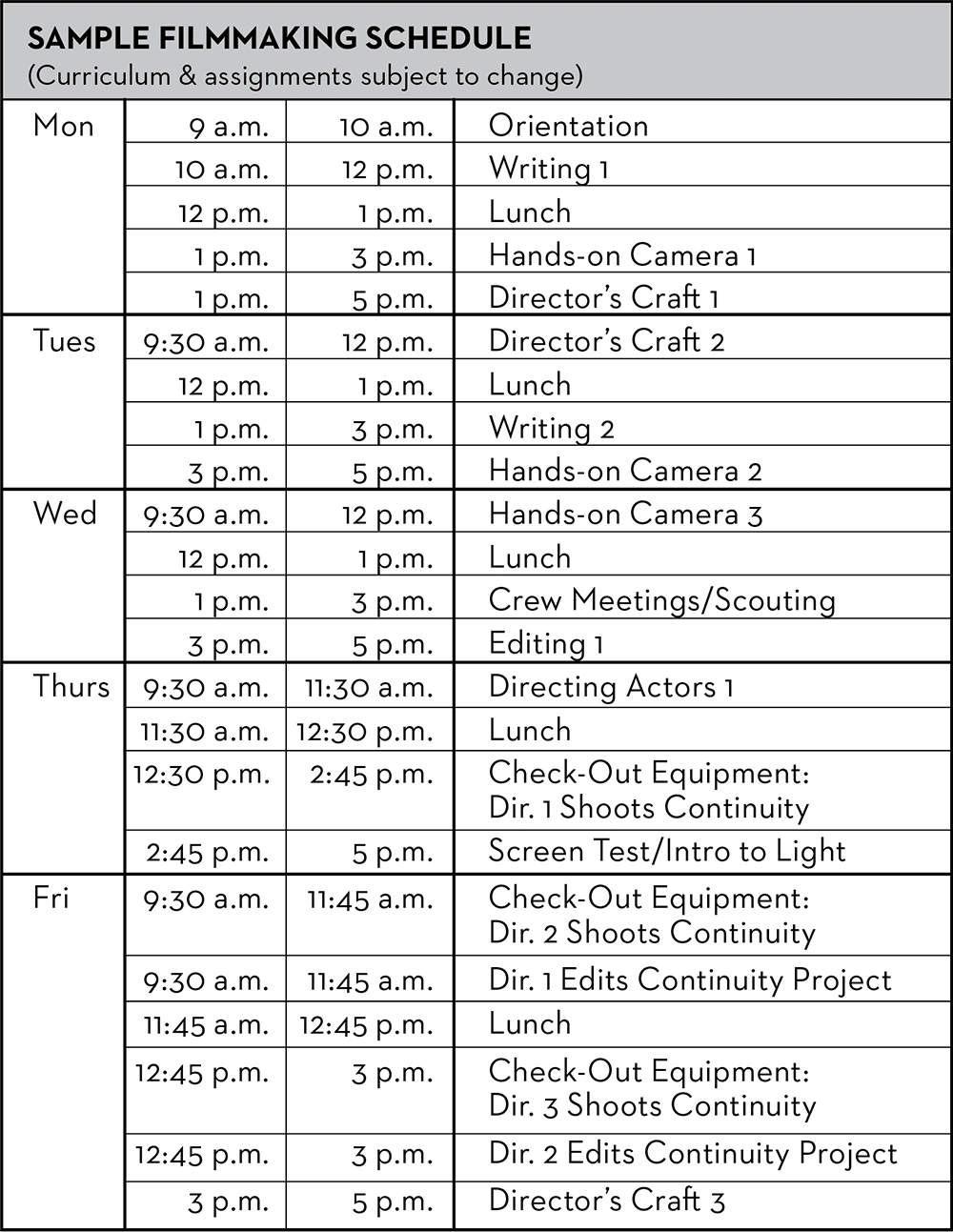
FILMMAKING II STUDENTS
Filmmaking II students must get ready for a particularly intense and rewarding program. They will be writing, directing, and editing a single, advanced sync-sound project with professional equipment. This is a serious project, of the type typically not seen until junior or senior year of college. These camps will challenge students’ creative, collaborative, organizational, and leadership skills to the utmost. The final products can be quite impressive, but equally important are the learning experience and the bonds that students can form.
We suggest Campers come with a draft of a script of between 5-8 pages, since production will begin at the end of the second week after the program begins. But if you don’t have a script ready, prepare by writing any story ideas, character notes, and other thoughts, so you can be ready to discuss them with both your directing and screenwriting instructors, speed up the development process, and be ready on time to shoot it. While these ideas will evolve once the program begins, it will be a great help to have something prior to starting the workshop. This drafts must be e-mailed to the school director and/or screenwriting teacher a week before the program begins, to [email protected].
Students should watch as many short films (under 10 minutes) as possible. While dialogue is permitted, the best films we’ve seen keep the dialogue to a minimum. Students still must strive to be visual directors.
We will provide a flash drive to all students with their final project(s) but if students wish to take home their raw footage and the films of their classmates, they should plan to bring a portable hard drive of at least 250 GB.
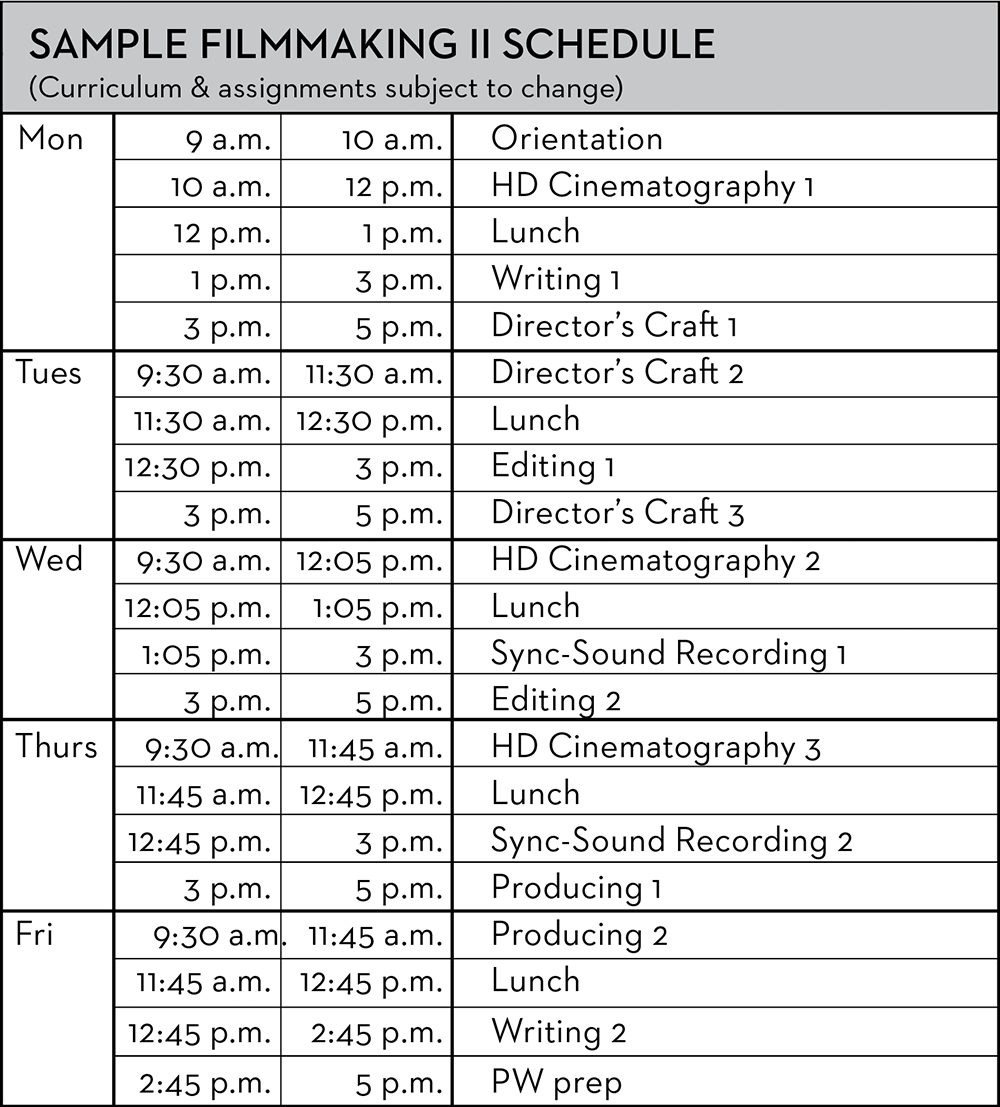
DOCUMENTARY FILMMAKING STUDENTS
Documentary film students should prepare by watching some of the readily available documentary films from sources like Netflix. We also recommend that you begin to think of subjects that excite you and research those subjects. You can brainstorm, draw, and write out ideas – remember to think visually!
It’s important to come to camp with an open mind. Inevitably, ideas will develop as inspiration hits and often times documentary films have to adapt to the world. Be prepared to roll with the punches.
While there is no required reading, students may want to watch: Super Size Me, Tarnation, The Square (Academy Award nominee, Director of Photography/Co-Producer is a NYFA alum), Joe’s Violin (Academy Award nominee Produced by NYFA alum), Thin Blue Line, Making a Murderer or OJ Made in America, any episodes of VICE on HBO.
We recommend that you bring a notebook.
We will provide a flash drive to all students with their final project(s). However, we recommend that documentary filmmaking students bring a 32 GB USB flash drive or portable hard drive onto which they can upload their projects. If students also wish to take home their raw footage and the films of their classmates, they should plan to bring a portable hard drive of at least 250 GB.
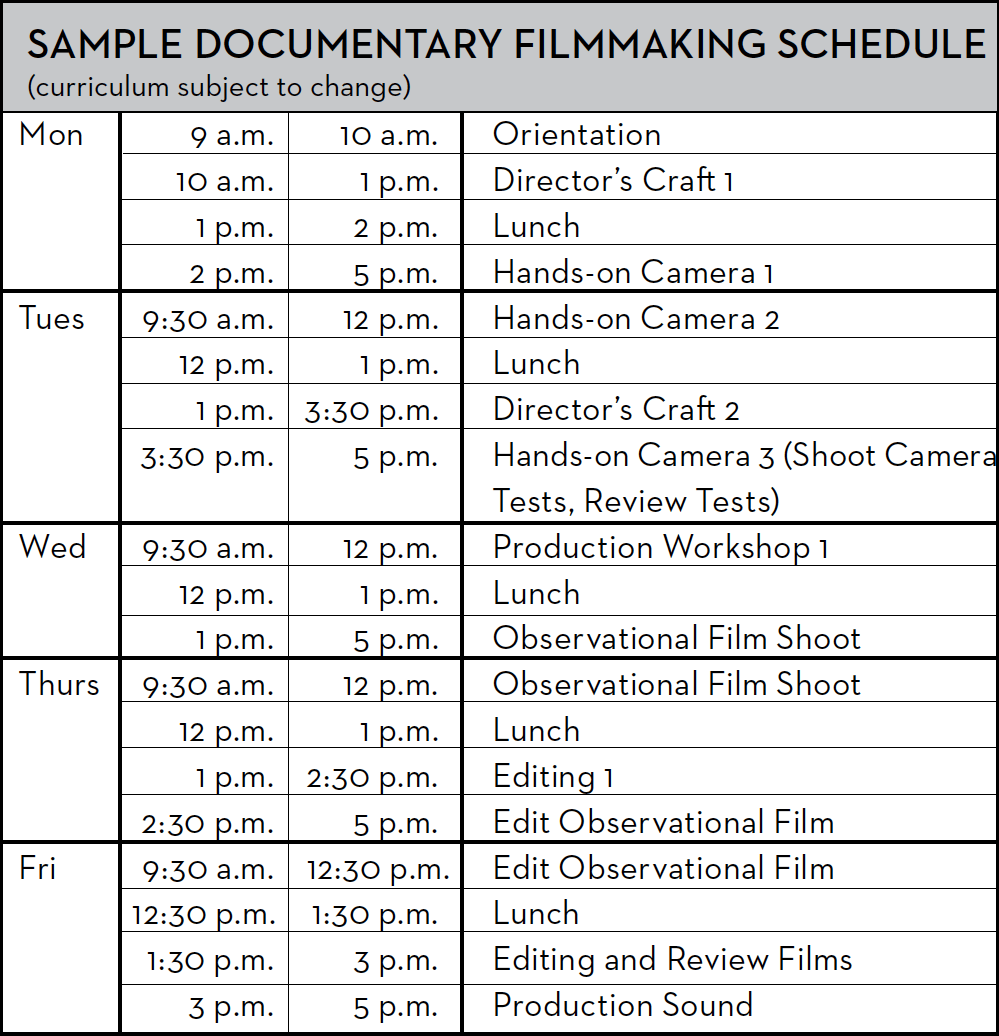
ACTING FOR FILM STUDENTS
Acting for Film students can prepare by watching their favorite actors, then reflecting on what is it about the performance that makes the actor so captivating. Students should note specific scenes that move them.
For books on acting and technique, feel free to look at: “Respect for Acting” or “A Challenge for the Actor”, both by Uta Hagen, “On Acting” by Sanford Meisner or “A Dream of Passion” by Lee Strasberg.
No experience is necessary to succeed in our acting for film workshops. However, you must come prepared to work in a collaborative and supportive environment.
Be prepared to expand your comfort zone and jump into new experiences. This is an exciting and personal program. Be ready to explore body movement, voice techniques, scene study, improvisations and of course, acting for the camera. All students should bring comfortable clothes that allow for a full range of motion.
Actors should bring a notebook and pen to every class.
On the first day, 3-week students may be asked to share a prepared monologue with the group and members of the faculty. Your monologue should be memorized and no longer than two minutes long.
There are a TON of monologue books and websites; if you simply Google “monologues” you will find access to all sorts of monologue databases. You may also find monologues from a play or movie you particularly enjoy. Your local bookstore will probably have several monologue books.
If you are having trouble finding a monologue, we will provide a generic monologue to everyone a few weeks prior to your first day.
Students in the 1-Week program will not need to prepare a monologue. You can bring a monologue you would like to work on throughout the program, but be mindful that instructors may also assign specific monologues due to the brevity of the 1-Week camp.
We will provide a flash drive to all students with their final monologue and/or scene. We highly recommend that 3-Week acting students bring a USB flash drive (at least 16 GB) onto which they can upload all of their raw footage and filmmakers’ projects.
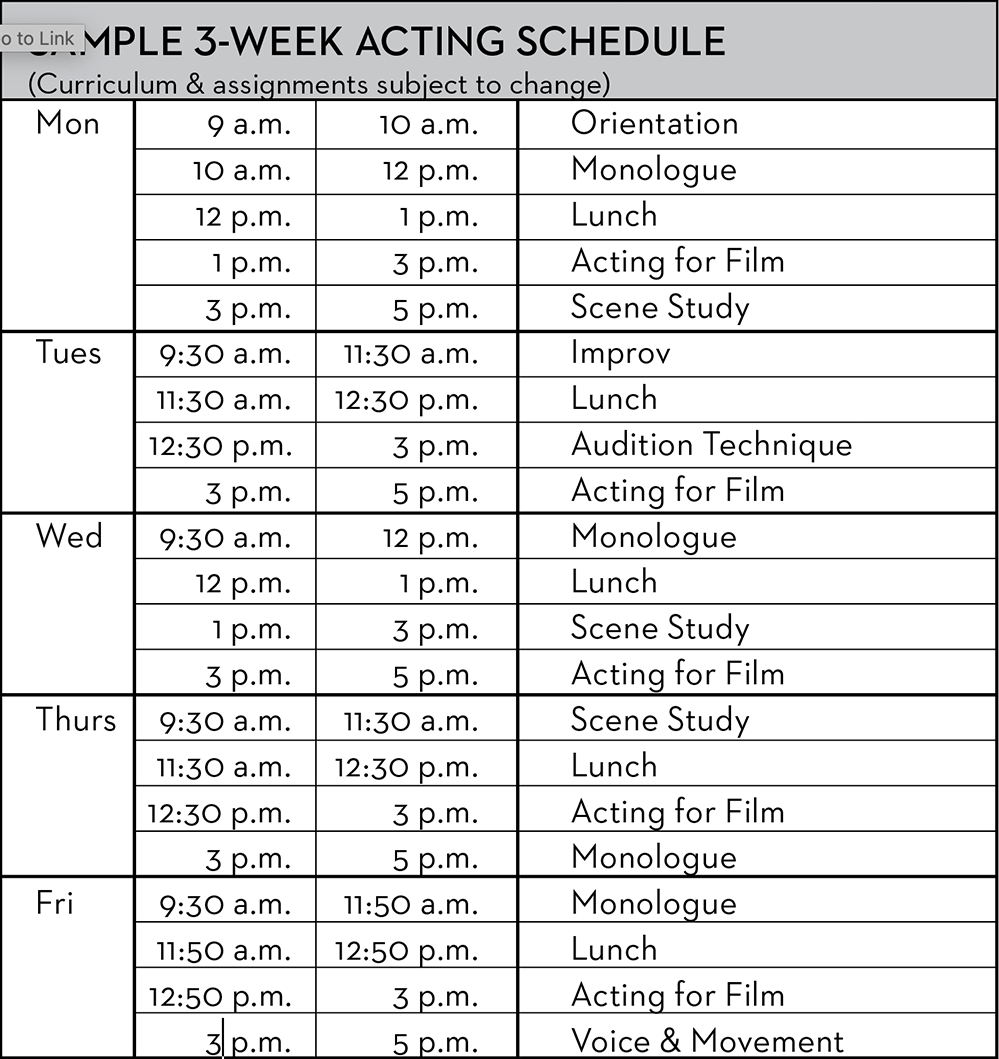
ACTING FOR FILM II STUDENTS
During the months before the workshop, Acting for Film II students can prepare by studying their favorite screenplays, teleplays, or theatrical scripts.
Other suggestions for preparation for our acting for film II camp include:
- Listing performances that moved you. Ask yourself: Why did you connect with that character? If you were cast in that role, what choices would you have made?
- Watch performances from your favorite films with the sound turned off. How is the emotion of the scene conveyed without dialogue?
- Pick a favorite character you would like to play in a movie, TV
- show, play, or even video game. How would you make the character your own?
We hold the acting for film II students to a higher standard. As a result, very little time will be spent on review before the challenging material begins. Students will be pushed further and expected to give more.
We will provide a flash drive to all students with their final monologue and/or scene. We highly recommendthat 3-Week acting for film students bring a USB flash drive(at least 16 GB) onto which they can upload all of their raw footage and filmmakers’ projects.
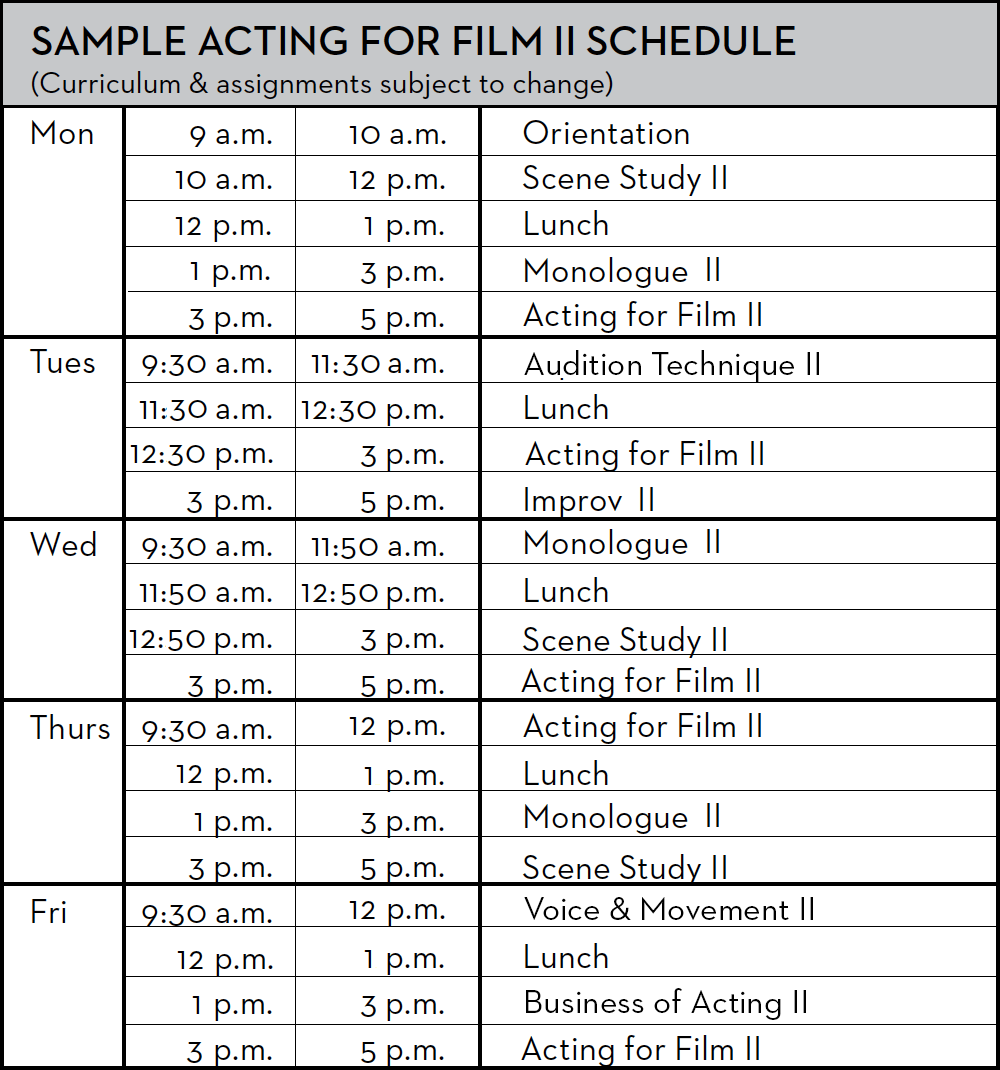
MUSICAL THEATRE STUDENTS
All Musical theatre students should come to class wearing comfortable athletic clothing that will allow freedom of movement – extensive dance/choreography classes are an essential part of this program.
The first day of class will include a dance placement audition. We also ask that you prepare a short monologue (30-60 seconds) and two contrasting songs with sheet music in the correct key. These songs should be short (about a 32-bar cut). You’ll likely be asked to sing these songs in some of your first classes so your teachers can get an idea of your vocal and character type. From there they will help recommend additional pieces to work on throughout the program.
Students should also bring the following materials:
- Split-soled jazz shoes (black split sole sneakers or soft sole leather are recommended)
- Ballet slippers (any color, can be canvas or leather)
- Tap shoes
- Three ring binder and non-glare protective sheets
- Digital recording device
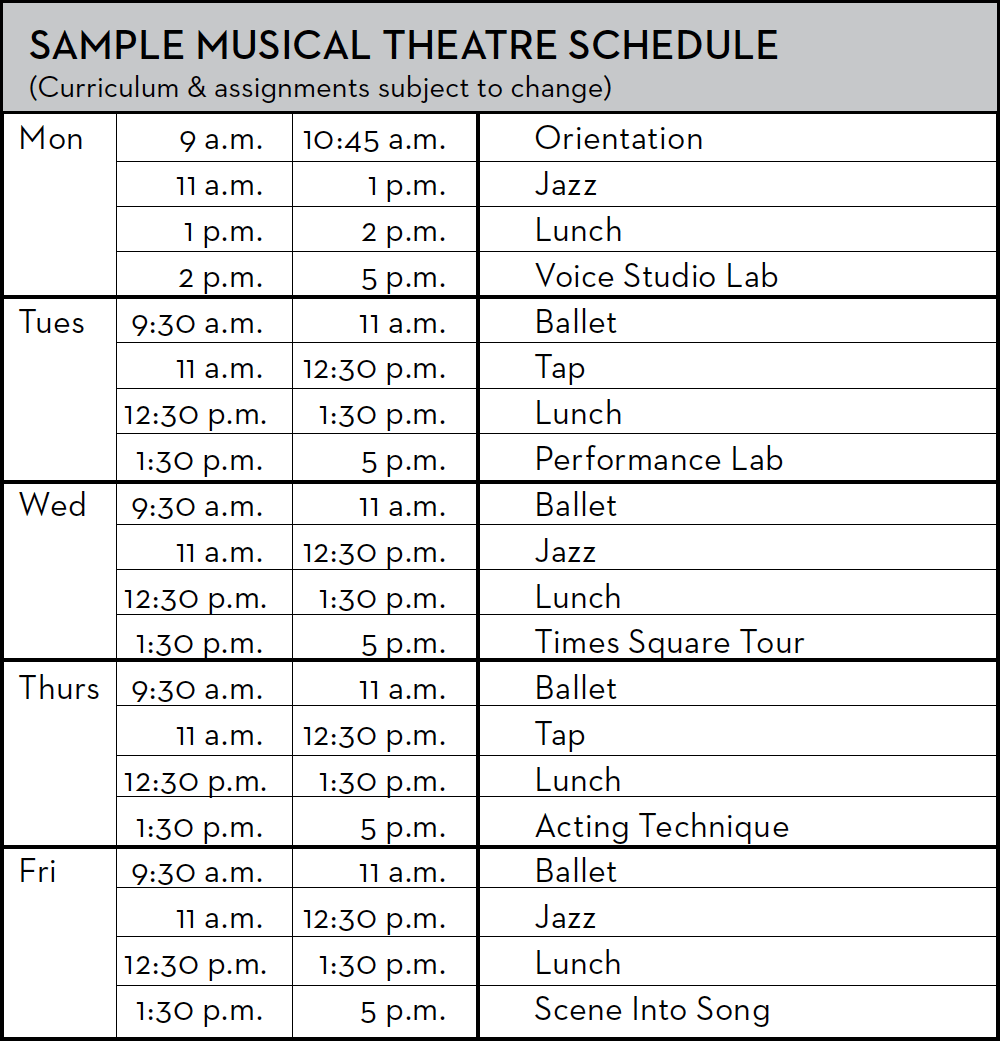
BROADCAST JOURNALISM STUDENTS
Broadcast journalism students should spend time exposing themselves to a wide variety of broadcast journalism programming in order to familiarize themselves with style as well as appropriate and interesting content. Students should sample this programming as part of their daily routine for reliable news information.
Suggested TV programs include: “NBC Nightly News”, “ABC World News Tonight”, “CBS Evening News”, and “PBS NewsHour”.
Websites that broadcast journalism students may want to check out include: msnbc.com, cnn.com, bbc.co.uk, nytimes.com, globalpost.com (news), mediastorm.org (independent documentaries and short films), visionproject.org (photography, investigative journalism, documentary film and multimedia).
On the radio, students can listen to NPR, especially the programs “Morning Edition” and “All Things Considered.” Also noteworthy: “On the Media.”
Broadcast journalism students can also begin to think about stories they are interested in researching.
At NYFA, students will learn the key skills necessary to be a multimedia journalist – reporting, shooting, writing and editing. Working as part of a production team, they will leave knowing the who, what, where, when and why of digital journalism.
We will provide a flash drive to all students with their final project(s). However, if students wish to take home copies of their friends’ work or their raw footage, we highly recommend bringing a 16 GB USB flash drive or portable hard drive.
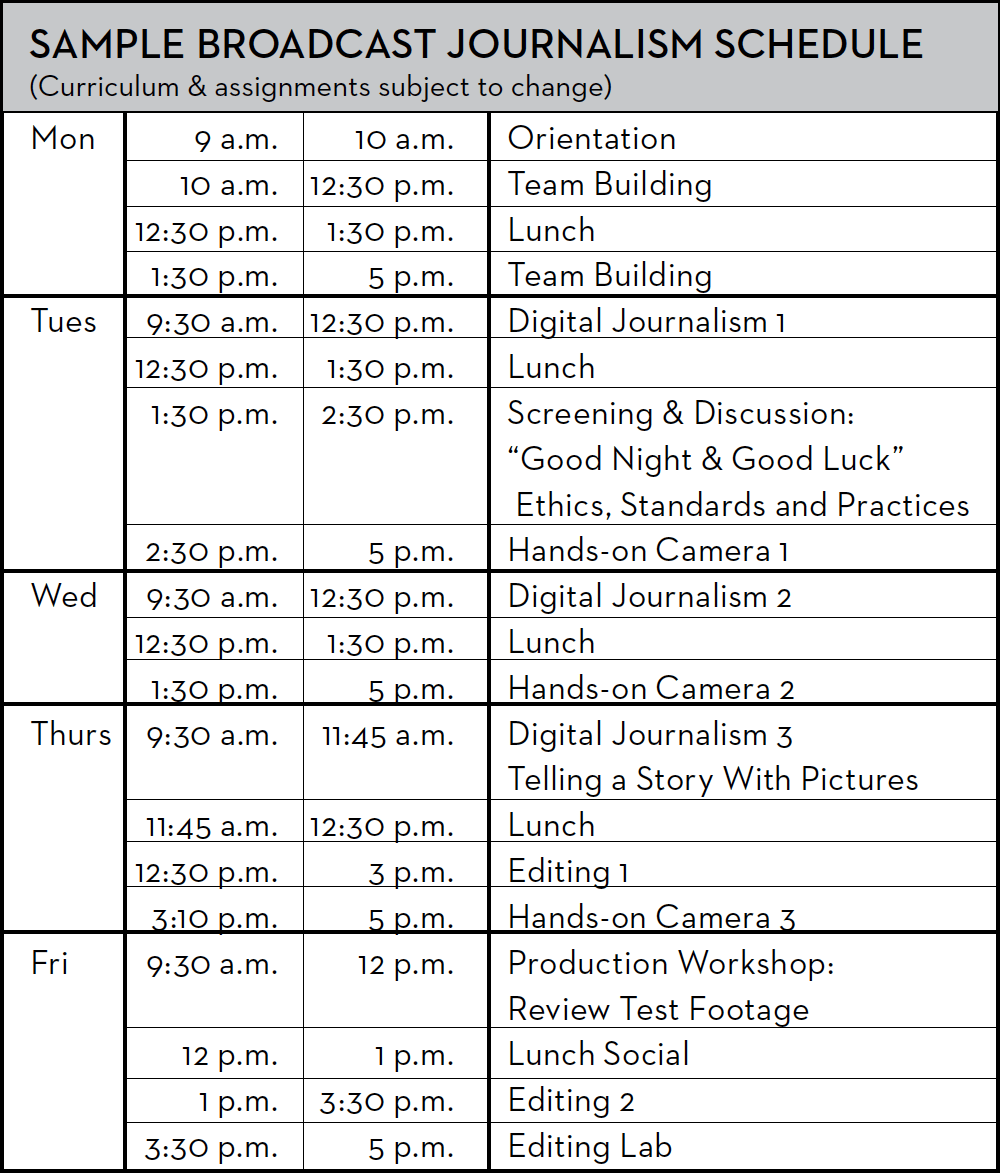
SCREENWRITING STUDENTS
Screenwriting students should begin to read film scripts (found online or in compilations in the bookstore) to get comfortable with the format and language of screenwriting. We emphasize visual storytelling rather than storytelling through dialogue, so students should also strive to note scenes that work primarily through images.
Screenwriters should come up with three ideas for short films (under 20 minutes in length).
While there is no required reading, instructors have found “The Short Screenplay: Your Short Film from Concept to Production” by Dan Gurskis to be a useful text. Students should watch as many movies as they can.
*While screenwriting students can write freehand in notebooks, it would be much easier to work on your scripts on a tablet or laptop. Bring one if you own one!

DIGITAL PHOTOGRAPHY STUDENTS
Photography students will need to bring a digital camera with manual exposure and manual focus controls. An DSLR (single-lens reflex) is highly recommended, although point and shoot cameras with manual controls are also permissible.
OTHER ITEMS TO BRING FOR YOUR CAMERA:
- An external portable bus-powered hard drivewith a Thunderbolt or USB 3.0 or 2.0 interface. 500GB-1TB size is recommended; 1TB is an excellent choice. Avoid miniature drives that only have the micro USB connection. 7200RPM drives will be faster than 5400RPM. LaCie, Verbatim, G-Tech and Iomega make excellent 1TB portable drives. Bringing a second hard drive just to be safe is highly recommended. A USB flash drive will also be helpful to move files between computers. Any capacity.
- Please bring at least two memory cards for your camera. 16-32GB cards, Lexar or Sandisk, are recommended. Unless you are shooting video with your SLR, they need not be the fastest models.
- Don’t forget your charger! An extra battery for your camera body is also helpful.
- If you have a portable flash, bring it, with plenty of batteries. If you have a PC sync cable for it and/or wireless trigger systems such as the Interfit Strobie iSync or Pocket Wizard II or III transceivers, bring those as well. However, we suggest that you work with our equipment and be thoroughly schooled in its use rather than purchasing any of this gear yourself before your course.
- A sturdy, unlined sketchbook. 8.5×11” or 11×14” size is recommended.
- Two 4B pencils and a pencil sharpener that catches shavings. Do NOT buy pencils harder or softer than 4B. Also, some favorite pens for taking notes. You should also bring a soft kneaded eraser.
- 10 favorite images that you have shot for class discussion in the first week as prints (preferably) or in high resolution JPEG format on a drive.
PREPARATION FOR THE CAMP:
A great way to prepare for the photography program is to look at photography, paintings and drawings! If you have access to art museums, spend time there, and note the names of your favorite artists. Before your course, spend some time looking at the work of the following photographers at least online, and in book format in your local bookstore or library if possible:
Photojournalists:
- Sebastiao Salgado – look at his books, particularly “Workers”.
- Steve McCurry
- James Nachtwey
- Henri Cartier-Bresson
- Eugene Richards
Portraiture:
- Diane Arbus– documentary/art crossover
- Yousuf Karsh– be sure to read the stories about the making of the photos.
- Annie Leibovitz– commercial editorial work
- Arnold Newman
Fine Art:
- Keith Carter
- Loretta Lux
- Ernst Haas
- Joel Meyerowitz
Commercial Photographers:
- Erik Almas
- David LaChapelle
- Jay Maisel
- Matthew Turley
Online Collections:
- Photo Tractatus collection on Flickr
- Photo Eye gallery– fine art oriented
- Masters of Photography– selected works from many photographers
- National Geographic image collection– photojournalism
